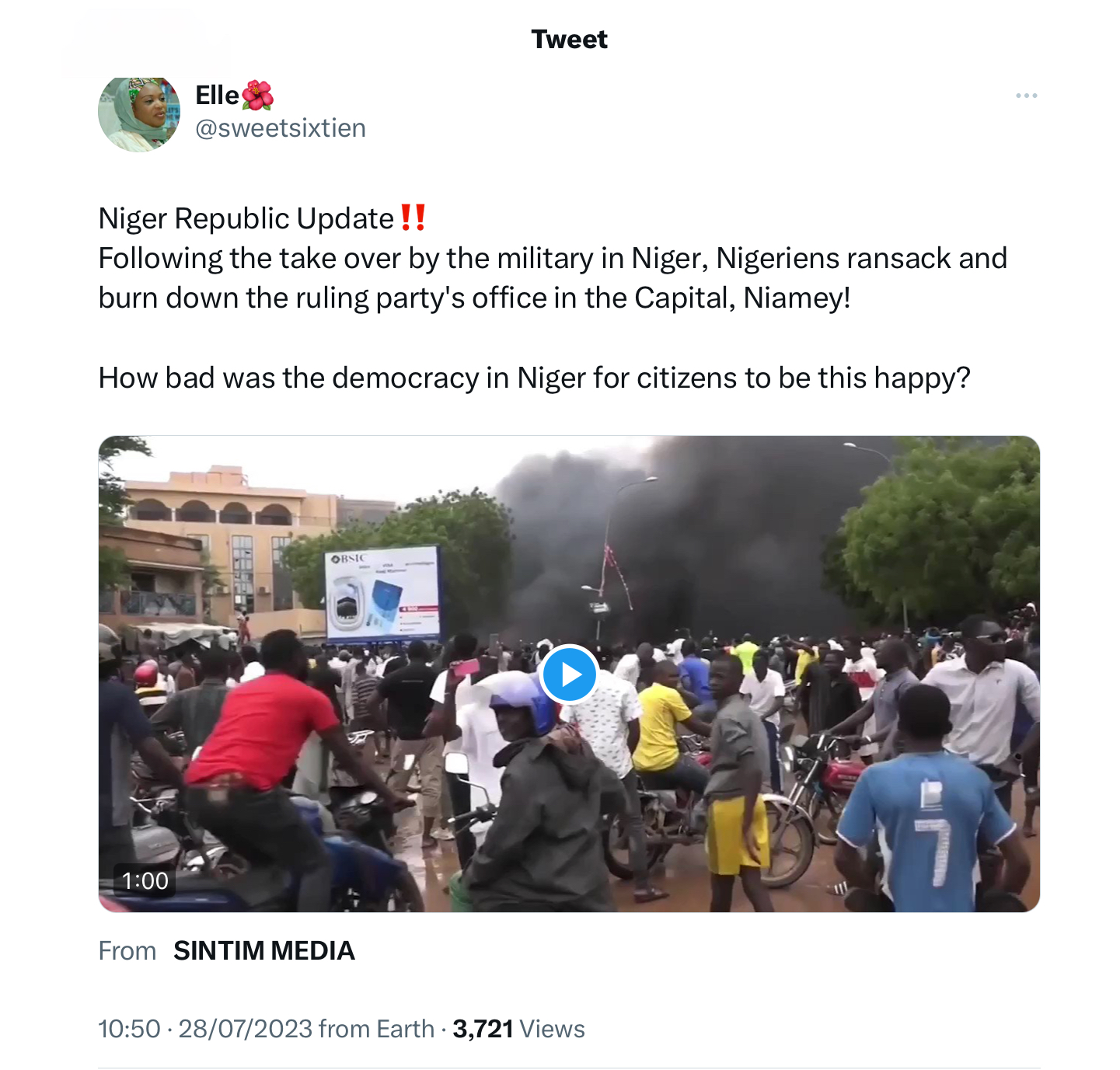On Wednesday evening 26th July, soldiers from Niger’s President Mohamed Bazoum’s own Guard seized and detained him as others announced his overthrow on Television.
The end of yet another regime
Appearing on Television, Colonel Amadou Abdramane, along with nine of his senior officers declared that defence and security forces had decided to:
‘put an end to the regime due to the deteriorating security situation and bad governance’
The Air Force Colonel Abdramane, went on to state that the army had decided to suspend the constitution, that the airport had been closed and a new curfew had been imposed. He added that the former President Mohamed Bazoum, was being kept safe.
Regional and international condemnation
As messages of support for President Bazoum started to appear online, urging a restoration of democracy, not least from the US President, Joe Biden, Colonel Abdramane issued a warning against any form of intervention or interference from outside forces.
The regional economic platform, the Economic Community of West African States (ECOWAS), issued a statement declaring the seizure an ‘attempted coup d’etat’ and called for Bazoum’s immediate and unconditional release, warning that all involved would be held to account for his safety.
This statement was officially supported by the European Union adding that they condemned:
‘any attempt to destabilise democracy and threaten the stability [of Niger]’
The UN Secretary-General Antonio Guterres said he:
‘strongly condemns the unconstitutional change in government’
France’s Foreign Minister, Catherine Colonna, condemned
‘all attempts to take power by force’
Recent historic visit by US Secretary of State, Anthony Blinken now seen as a failure
It was only a few months ago on March 16th, that US Secretary of State, Anthony Blinken made a historic visit to Niger to meet the President Bazoum – the first ever visit to the country by a US Secretary of State. The visit was promoted as looking to ‘advance US – Niger partnership on diplomacy, development and defense’, but was widely seen as a move to stem the spread of a series of military coups taking place across the Sahel states – in Mali and Burkino Faso, as well as to block the increasing Russian influence in the region. A vacuum had been created following the departure of European troops and it is understood that Wagner mercenaries had been deployed to help defeat the so called Islamist insurgency that has gripped significant parts of the country.
Post the visit and in the face of growing insurgencies from various reportedly al-Qaeda linked militias in the region and Boko Haram forces in neighboring Northern Nigeria, Niger was hailed by the Assistant Secretary of State, Molly Phee, as:
‘one of the most important partners on the continent in terms of security cooperation’
US Secretary of State, Anthony Blinken, during his visit to New Zealand, issued a statement on Thursday from Wellington, in which he called for Bazoum’s release. He said:
‘Whether this constitutes a coup technically or not, I can’s say, that’s for the lawyers to say, but what it clearly constitutes is an effort to seize power by force and to disrupt the constitution’
President Bazoum regarded as the West’s last hope to restore stability and repel growing insurgency across the Sahel
President Bazoum has been regarded as the West’s main hope in the region – a safe pair of hands at a time when there has been a growing lack of faith by the Niger’s citizens and those across the Sahel, in European interventions – in particular following the collapse of the French led European Union task force in Mali in 2022. This will make Bazoum’s removal all the more a concern for Western powers.
Niger is a country riven with poverty which has faced one coup after another since independence
98% of Niger’s 23 million population are of Muslim faith, the vast majority of whom live in abject poverty. The country ranks at the bottom of the UN list of least developed countries in the world.
Since it gained its independence from France in 1960, Niger has experienced a period of military rule with a short breakthrough for democratic elections which took place in 1991. It was not long before the country was once again the victim of a series of military coups, taking place in 1996, 1999, and again in 2010. Issoufou Mahamadu, was then successfully elected as president in 2011 and was reelected in 2016. Mohamed Bazoum’s election in 2021, represented the first successful transition from one democratically elected president to another. His removal this week, underlines the vulnerability of the entire region. The premature end to his administration will not come as a surprise to many political pundits as they ponder the implications for the region, especially given allegations that the ousted President was providing support and logistics to the militias of the RSF in Sudan. The overthrow of Bazoum in Niger may well have a significant impact on events in Sudan.
https://twitter.com/sweetsixtien/status/1684863860593889281?s=61&t=5ZpKzLG25fYWjVGrkZp97g

















